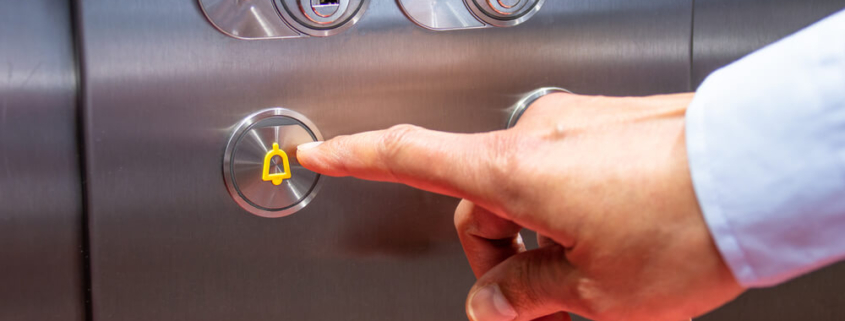Commercial Property Owners and Liability for Elevator Accidents
Commercial property owners owe a duty of care to ensure the safety of their premises, including the maintenance and upkeep of elevators. Proving negligence is fundamental to determining liability in elevator and escalator accidents. An experienced premises liability lawyer can prove the commercial property owners’ liability in elevator accidents to help you obtain maximum financial compensation for your injuries and losses.
How Do Elevator Accidents Occur in Atlanta?
Elevator accidents can encompass a range of incidents, including:
- Mechanical Failures: Malfunctions due to improper maintenance or manufacturing defects.
- Slips and Falls: Tripping hazards, uneven flooring, or inadequate lighting.
- Entrapment: Doors closing unexpectedly or malfunctioning.
- Sudden Stops: Abrupt stops due to electrical issues or mechanical failures.
These incidents can result in injuries varying from minor bruises to severe fractures or worse, depending on the circumstances and the victim’s position during the accident.
Legal Principles in Georgia Regarding Commercial Elevator Accidents
Comparative Negligence
Georgia follows a modified comparative negligence rule. This means that if the plaintiff is partially responsible for their injuries (e.g., by not using the elevator properly), their compensation may be reduced proportionally to their degree of fault. However, if the plaintiff is found to be 50% or more at fault, they may be barred from recovering any damages.
Statute of Limitations
There is a limited timeframe within which a lawsuit must be filed after an elevator accident. This statute of limitations typically starts from the date of the accident or when the injury was discovered, and it varies depending on the specifics of the case. As per Georgia Code § 9-3-33, you have two years from the date of injury to file a lawsuit.
Regulatory Compliance
Elevators in Georgia must comply with state and federal safety regulations, including those set forth by the Georgia Department of Labor’s Elevator Safety Program and the Occupational Safety and Health Administration (OSHA). Compliance with these regulations is important while establishing a standard of care and determining liability.
Liability of Commercial Property Owners in Atlanta Elevator Accidents
In Georgia, commercial property owners have a legal duty to maintain their premises in a reasonably safe condition for visitors. This duty extends to elevator maintenance and safety. Negligence may arise from:
- Inadequate Maintenance: Failure to conduct regular inspections or address known issues promptly.
- Defective Equipment: Issues stemming from faulty manufacturing or improper installation.
- Lack of Warning Signs: Failure to warn occupants about potential hazards or temporary malfunctions.
To establish liability in an elevator accident case, the injured party (plaintiff) must prove that the property owner (defendant) was negligent. This includes demonstrating that the property owner knew or should have known about a dangerous condition related to the elevator and failed to take reasonable steps to remedy it.
Other Potential Defendants in Elevator Accident Claims
- Manufacturers
- Installation Companies
- Inspection Companies
- Property Management Companies
- Contractors and Subcontractors
- Engineers and Architects
- Previous Owners
- Component Suppliers
A tough and relentless personal injury attorney can help you prove negligence beyond a doubt and obtain maximum recovery.
Steps to Take After an Elevator Accident for a Fair Outcome
If you or someone you know is involved in an elevator accident on commercial property in Georgia, it is important to take these steps:
- Obtain Medical Attention: Priority should be given to addressing any injuries sustained.
- Report the Incident: Notify the property management or owner immediately.
- Document Everything: Take notes and pictures, and gather witness contact information.
- Consult with an Attorney: An experienced attorney can assess your case and determine the best course of action.
Types of Evidence Your Attorney Can Collect to Prove Liability of the Commercial Property Owner
Maintenance and Inspection Records
- Documentation of routine maintenance and inspections performed on the elevator.
- Records of any repairs or modifications made to the elevator.
- Reports from regulatory inspections by entities like the Georgia Department of Labor’s Elevator Safety Program.
Incident Reports
- Official reports filed by the property owner or management company regarding the elevator accident.
- Reports from emergency responders who attended the scene of the accident.
Witness Statements
- Testimonies from individuals who witnessed the accident, including tenants, visitors, and employees.
- Statements from maintenance personnel or building staff regarding the condition of the elevator and any known issues.
Expert Testimony
- Opinions from elevator safety experts who can analyze the evidence and provide professional assessments of the elevator’s condition and the cause of the accident.
- Testimony from medical experts about the extent and impact of the injuries sustained.
Design and Manufacturing Records
- Documents related to the design, installation, and manufacturing of the elevator, which could reveal defects or issues contributing to the accident.
- Records of any recalls or safety notices issued by the manufacturer.
Maintenance Contracts
- Agreements between the property owner and maintenance companies detailing the scope and frequency of maintenance services.
- Performance records of the maintenance company, including any history of negligence or inadequate service.
Building Codes and Regulations Compliance
- Evidence showing whether the property owner complied with local, state, and federal building codes and safety regulations related to elevators.
- Documentation of any previous violations or citations issued by regulatory bodies.
Choose Experienced Atlanta Elevator Accident Lawyers to Obtain Maximum Compensation
The skilled legal team at Dubose Miller has extensive experience in premises liability law in Georgia. We provide a result-oriented legal representation to our clients. Our attorneys will fight to obtain maximum compensation for medical expenses, lost wages, pain and suffering, and any other damages you have incurred. To set up your free consultation, call (404) 720-8111 or reach us online.




